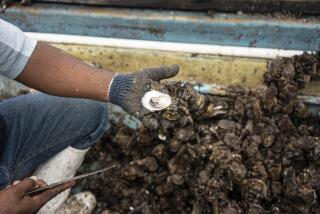Keeping yourself safe from that dreaded (and dreadful) ‘stomach flu’ at sea

- Share via
Two of your usual dinner companions aren’t in their seats, and when you look around at nearby tables you notice other empty seats too.
Then the rumors begin: Something’s going around. People are sick. There’s an epidemic.
It’s enough to give a passenger a case of anxiety. But a case of anxiety is better than a case of what’s often called stomach flu.
Sickness can spread like wildfire at sea. We’ve all heard the grim reports of cruise ship voyages beset by hundreds of cases of gastrointestinal illness, so many that ship infirmaries can’t handle all of them.
Maybe you’ve even been aboard a stricken ship where crew members dump globs of sanitizer on the hands of everyone in line for the buffet and nauseated passengers suddenly leave the room.
The good news here is that your odds of getting sick are slim, according to the Centers for Disease Control and Prevention.
“Acute gastrointestinal [AGE] illness is relatively infrequent on cruise ships despite their notoriety,” said Aimee Treffiletti, chief of the CDC Vessel Sanitation Program, which inspects cruise ships sailing in U.S. waters.
More good news: Chances you’ll get sick are declining, she said. Less than a quarter of 1% of the more than 73 million passengers who sailed between 2008-2014 suffered acute gastrointestinal illness.
You’re more likely to get sick at home.
Sometimes the cause is AGE, also known as norovirus, but not always.
“Norovirus is not the cause of all AGE illnesses on cruise ships,” Treffiletti said, “but even if we assumed that all cruise ship AGE cases were caused by norovirus, those cases would only account for 0.12% of the estimated 20 million norovirus cases in the United States each year.”
Norovirus is highly contagious and can spread anywhere people gather or food is served. It can be spread by touching infected surfaces that have been touched by ill people.
When you touch a stair railing, elevator button or doorknob, for instance, you could come in contact with the culprit germ.
It’s the leading cause of disease outbreaks from contaminated food in the U.S.
It usually lasts one to three days. It can hit children and older people harder.
Here’s some advice from the CDC on how to avoid norovirus and other stomach problems when you cruise — or on any vacation:
►Wash your hands often with soap and water, lathering up for a full 20 seconds. Wash them before eating or touching your face and after using the bathroom, changing diapers or touching things that other people have touched, such as stair railings.
►Be careful about the food you eat while on shore, especially in developing countries.
►Eat only the type of food that is cooked and served hot, and drink only beverages from sealed containers. Skip ice and eat fresh produce only if you have washed it yourself in purified water.
Regardless of where you travel, be sure you and your family members are up to date on routine vaccines, such as measles, mumps, rubella, chicken pox and seasonal flu.
Many fellow travelers and cruise ship crew members are from countries where vaccination for these diseases isn’t common.
CDC’s general vaccination recommendations, by country, can be found on the Travelers’ Health pages.
Discuss your upcoming cruise and its itinerary with your doctor. If you’re stopping in a country only for a short time or if you don’t plan to leave the tourist area around the dock, certain vaccines may not be necessary.
If all else fails and you become a victim, what should you do? Here’s some advice from Treffiletti:
►Report your illness by calling the ship’s medical facility and following the staff’s recommendations.
►Wash your hands often to avoid infecting others.
►Take care of yourself: Get plenty of rest and drink lots of water. Rest helps rebuild the immune system; drinking water will help prevent dehydration.
travel@latimes.com
@latimestravel
More to Read
Sign up for The Wild
We’ll help you find the best places to hike, bike and run, as well as the perfect silent spots for meditation and yoga.
You may occasionally receive promotional content from the Los Angeles Times.






